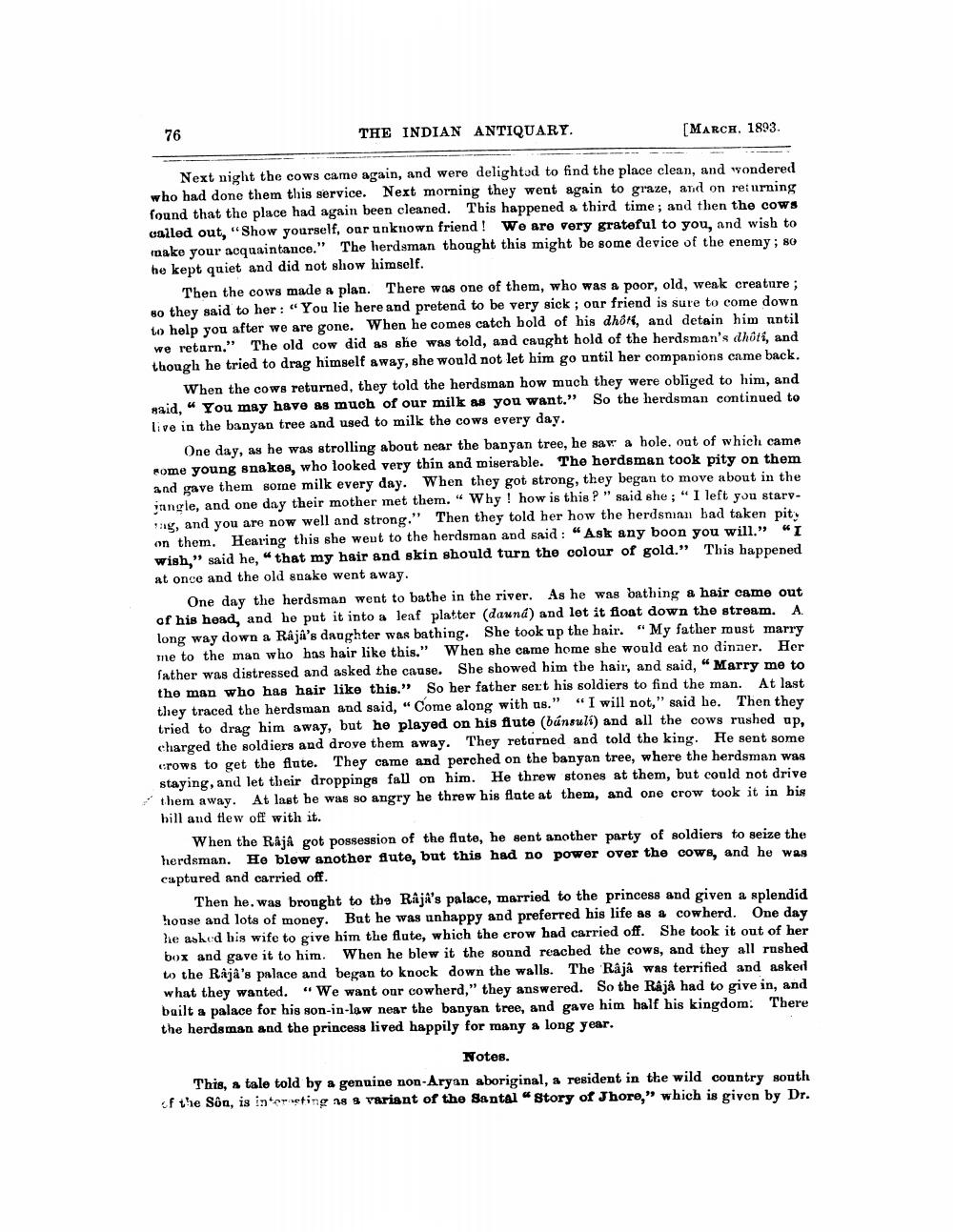________________
76
THE INDIAN ANTIQUARY.
[MARCH. 1893.
Next night the cows came again, and were delighted to find the place clean, and wondered who had done them this service. Next morning they went again to graze, and on returning found that the place had again been cleaned. This happened a third time; and then the cows called out, "Show yourself, our unknown friend! We are very grateful to you, and wish to make your acquaintance." The herdsman thought this might be some device of the enemy; so he kept quiet and did not show himself.
Then the cows made a plan. There was one of them, who was a poor, old, weak creature; so they said to her: "You lie here and pretend to be very sick; our friend is sure to come down to help you after we are gone. When he comes catch hold of his dhôt, and detain him until we return." The old cow did as she was told, and caught hold of the herdsman's dhoti, and though he tried to drag himself away, she would not let him go until her companions came back.
When the cows returned, they told the herdsman how much they were obliged to him, and said, "You may have as much of our milk as you want." So the herdsman continued to live in the banyan tree and used to milk the cows every day.
One day, as he was strolling about near the banyan tree, he saw a hole, out of which came Come young snakes, who looked very thin and miserable. The herdsman took pity on them and gave them some milk every day. When they got strong, they began to move about in the jangle, and one day their mother met them. "Why! how is this?" said she; " I left you starvtag, and you are now well and strong." Then they told her how the herdsman had taken pity on them. Hearing this she went to the herdsman and said: "Ask any boon you will." "I wish," said he, "that my hair and skin should turn the colour of gold." This happened at once and the old snake went away.
One day the herdsman went to bathe in the river. As he was bathing a hair came out of his head, and he put it into a leaf platter (dauna) and let it float down the stream. A. long way down a Raja's daughter was bathing. She took up the hair. "My father must marry me to the man who has hair like this." When she came home she would eat no dinner. Her She showed him the hair, and said, "Marry me to father was distressed and asked the cause. the man who has hair like this." So her father sert his soldiers to find the man. At last they traced the herdsman and said, "Come along with us." "I will not," said he. Then they tried to drag him away, but he played on his flute (búnsulí) and all the cows rushed up, charged the soldiers and drove them away. They returned and told the king. He sent some crows to get the flute. They came and perched on the banyan tree, where the herdsman was staying, and let their droppings fall on him. He threw stones at them, but could not drive them away. At last he was so angry he threw his flate at them, and one crow took it in his hill and flew off with it.
When the Raja got possession of the flute, he sent another party of soldiers to seize the herdsman. He blew another flute, but this had no power over the cows, and he was captured and carried off.
Then he was brought to the Raja's palace, married to the princess and given a splendid house and lots of money. But he was unhappy and preferred his life as a cowherd. One day he asked his wife to give him the flute, which the erow had carried off. She took it out of her box and gave it to him. When he blew it the sound reached the cows, and they all rushed to the Raja's palace and began to knock down the walls. The Râja was terrified and asked what they wanted. "We want our cowherd," they answered. So the Râjâ had to give in, and built a palace for his son-in-law near the banyan tree, and gave him half his kingdom: There the herdsman and the princess lived happily for many a long year.
Notes.
This, a tale told by a genuine non-Aryan aboriginal, a resident in the wild country south of the Sôn, is interesting as a variant of the Santal "Story of Jhore," which is given by Dr.




